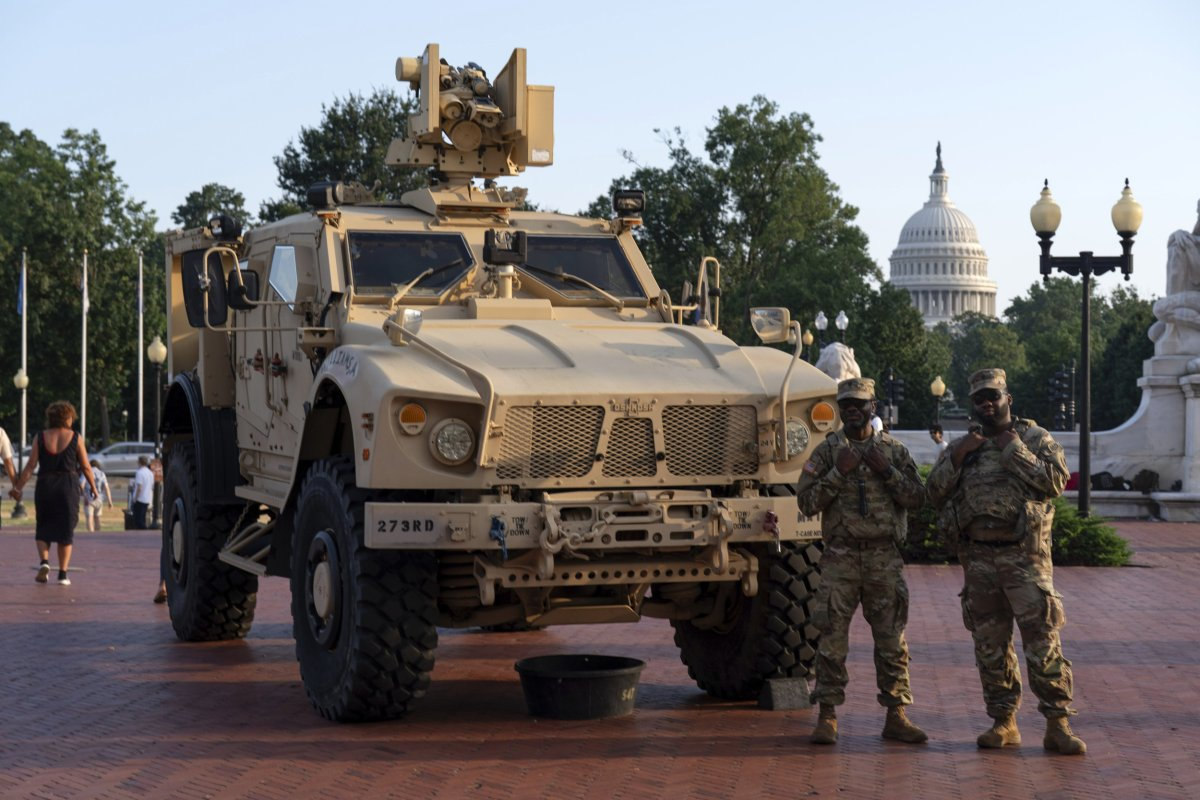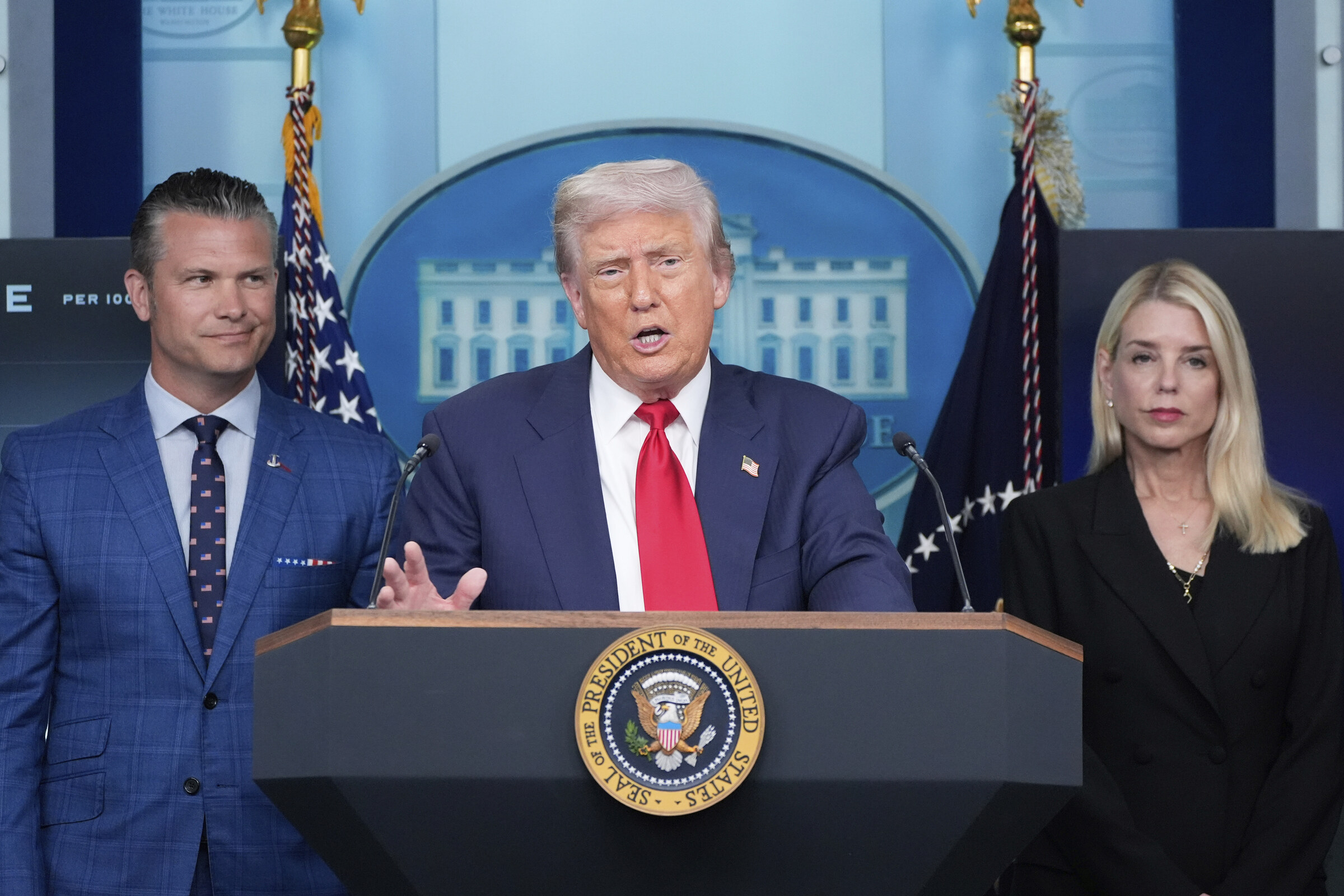Sergeant Craig Clapper, a spokesperson for the National Guard deployed to Washington DC, confirmed on 17/8 that soldiers patrolling the capital under President Donald Trump's orders are authorized to carry weapons.
This announcement suggests that armed soldiers, body armor, and Humvees will likely become a more common sight on the streets of Washington. It also signals a potential increase in the US military's involvement in domestic law enforcement, a role that has been significantly limited in the past.
The decision on 11/8 to deploy 800 National Guard troops to Washington DC is considered Trump's boldest move yet to expand the use of military power within the US.
 |
National Guard troops patrol the streets of Washington on 16/8. Photo: AP |
National Guard troops patrol the streets of Washington on 16/8. Photo: AP
This is one of several actions by Trump to increase the military's role and deployment within the US, sparking debate about the growing military presence at home.
Trump is using US military bases to detain undocumented immigrants and has deployed the National Guard to Los Angeles and the southern border for security.
"This could be interpreted as an attempt by Trump to gain public approval by taking credit for the already record-low crime rates in the capital," said Carrie Lee, senior fellow at the German Marshall Fund and former professor at the US Military Academy. "It could also be a test run for deploying troops to other US cities with a less clear legal basis."
On the same day Trump announced the National Guard deployment to Washington DC, a federal trial began in San Francisco addressing a lawsuit filed by California Governor Gavin Newsom. The lawsuit challenges the White House's direct control over the state's National Guard units two months prior.
The case could be the start of a broader conflict over the use of military force on US streets during a presidentially declared state of emergency.
Trump has long sought to increase the use of the US military for domestic issues, rather than relying solely on law enforcement. John Kelly, Trump's first White House chief of staff, reportedly told others that one of his biggest challenges was persuading the president not to use the military domestically. According to an anonymous source familiar with the matter, Kelly said Trump seemed to misunderstand that military deployment was only for extremely rare circumstances.
According to a senior administration official, since returning to the White House earlier this year, the president has become increasingly focused on homeless encampments he sees while traveling through the city to his golf course in Sterling, Virginia, or to the Kennedy Center.
"He's in the capital more and pays more attention to Washington news," the official said.
During the transition period, Trump raised the issue of crime with Washington Mayor Muriel Bowser and closely followed a series of incidents during the 4/7 holiday. The president has frequently discussed crime with senior aides, including deputy chief of staff Stephen Miller.
For nearly 150 years, the Posse Comitatus Act has strictly limited the military's role in domestic law enforcement, prohibiting the military from suppressing civilians, except in specific, legally defined cases. However, Trump appears increasingly comfortable deploying the National Guard and military within the US.
In June, the president deployed Marines and the California National Guard to Los Angeles to quell protests against Immigration and Customs Enforcement (ICE) raids on undocumented immigrants.
US troops initially sent to Los Angeles were tasked with protecting federal buildings, but their role expanded to escorting ICE agents during immigration arrests.
This deployment has no set end date. Initially, troops were expected to remain in Los Angeles for 60 days, but the Pentagon recently extended their deployment until early November. Only a few hundred of the nearly 5,000 National Guard troops remain in the city, mostly stationed at locations with federal buildings.
Trump also deployed troops and the National Guard to the US-Mexico border, detaining migrants within a newly established "National Defense Area". US Air Force transport planes are being used to transport undocumented immigrants out of the country.
Last month, Secretary of Defense Pete Hegseth announced that military bases in New Jersey and Indiana would be used to detain undocumented immigrants under the supervision of the Department of Homeland Security. This move will expand the network of military facilities used for immigrant detention.
Trump claimed the decision to send troops to the capital was necessary because Washington DC was "overrun by violent gangs and bloodthirsty criminals," emphasizing his goal of maintaining law and order, a message that resonates with his Make America Great Again (MAGA) supporters.
However, contrary to Trump's concerns, Washington officials reported that the city's violent crime rate last year fell to its lowest level in 30 years.
 |
US President Donald Trump during a press conference at the White House on 11/8. Photo: AP |
US President Donald Trump during a press conference at the White House on 11/8. Photo: AP
But Trump has shown little interest in these statistics, arguing that Washington DC needs to be "liberated." It's unclear how long the National Guard will be deployed in Washington.
"For the military, these missions are complex. Success or failure depends on the deployment plan, which is currently quite vague," said Peter Feaver, professor of political science and public policy at Duke University. "If their task resembles traditional police work, it will create more problems for the military, both legally and operationally."
Previous US presidents have deployed the National Guard to quell large-scale civil unrest, such as the riots in Washington following the 1968 assassination of Martin Luther King Jr.
President Lyndon Johnson then invoked the Insurrection Act of 1807 to deploy 1,750 National Guard troops and over 11,000 regular troops to support the capital's police force in responding to the protests.
Washington DC's home rule law gives the president more authority to use the National Guard than elsewhere in the country. The president has direct control over the Washington National Guard without needing to federalize the force, a requirement in other states.
"Washington has long been a special place, both politically and legally," said Stephen Vladeck, a professor at Georgetown University Law Center, emphasizing that residents will have to get used to a more frequent military presence in the city during Trump's term.
Vu Hoang (According to WSJ, AFP, Reuters)












